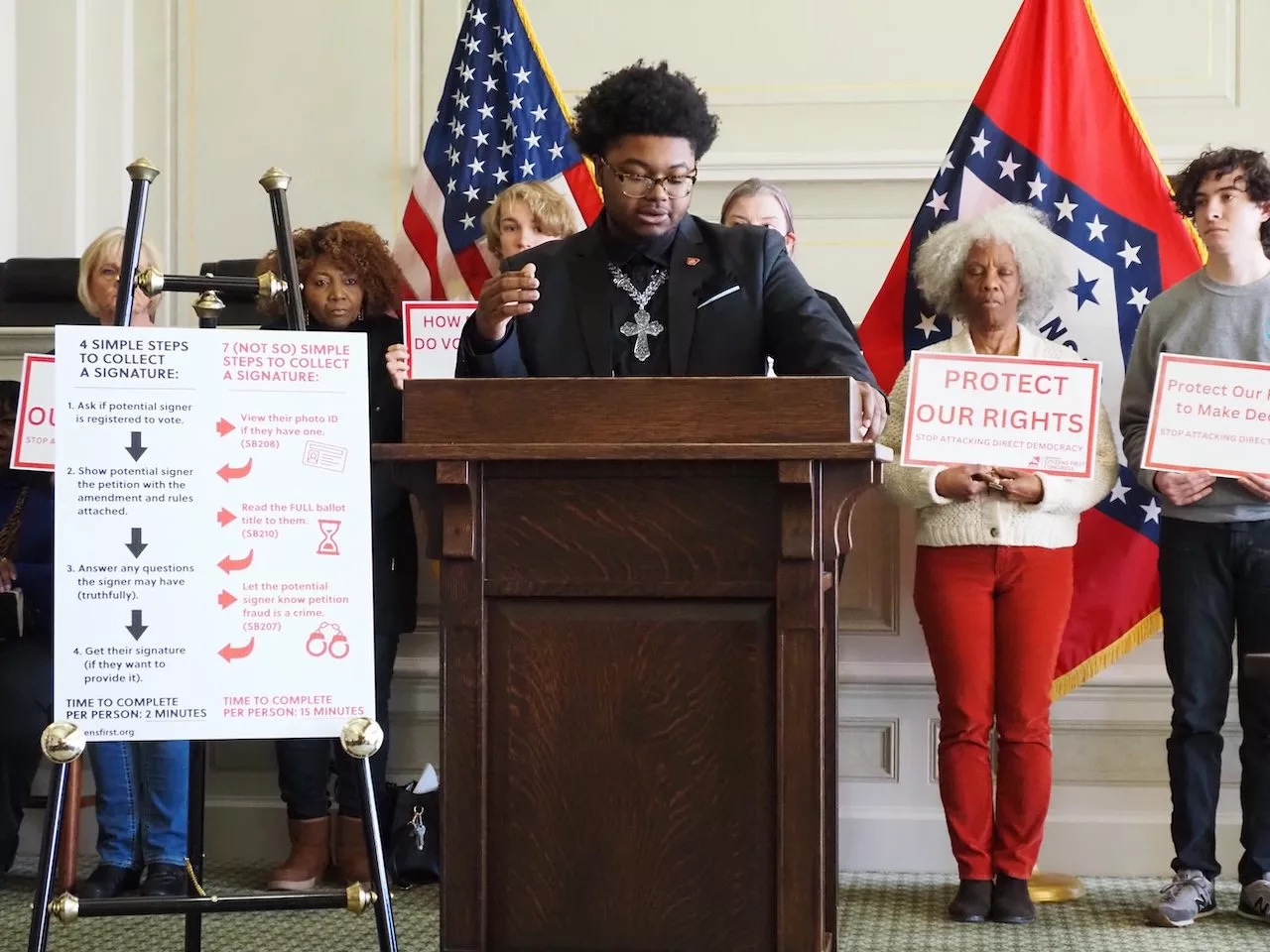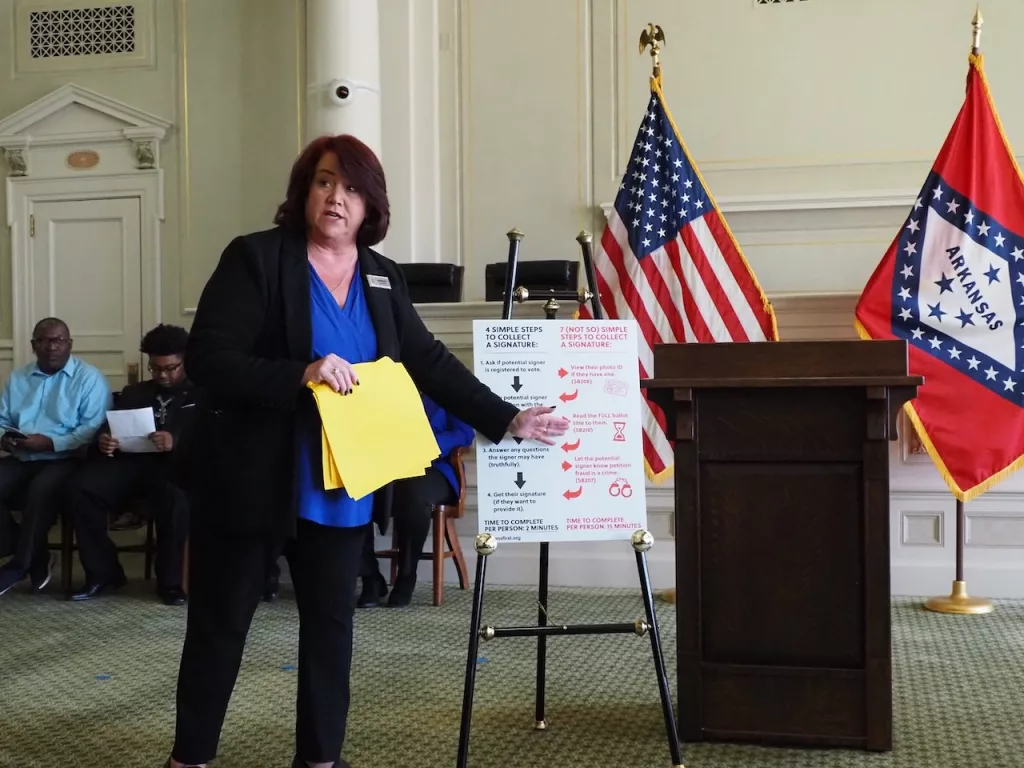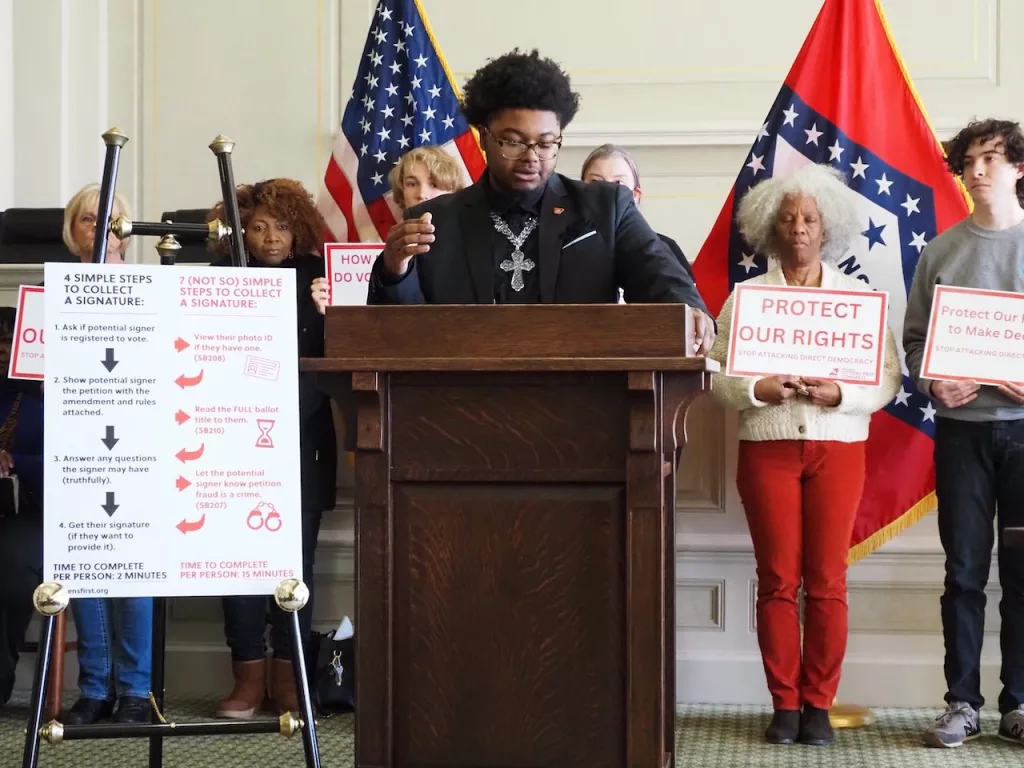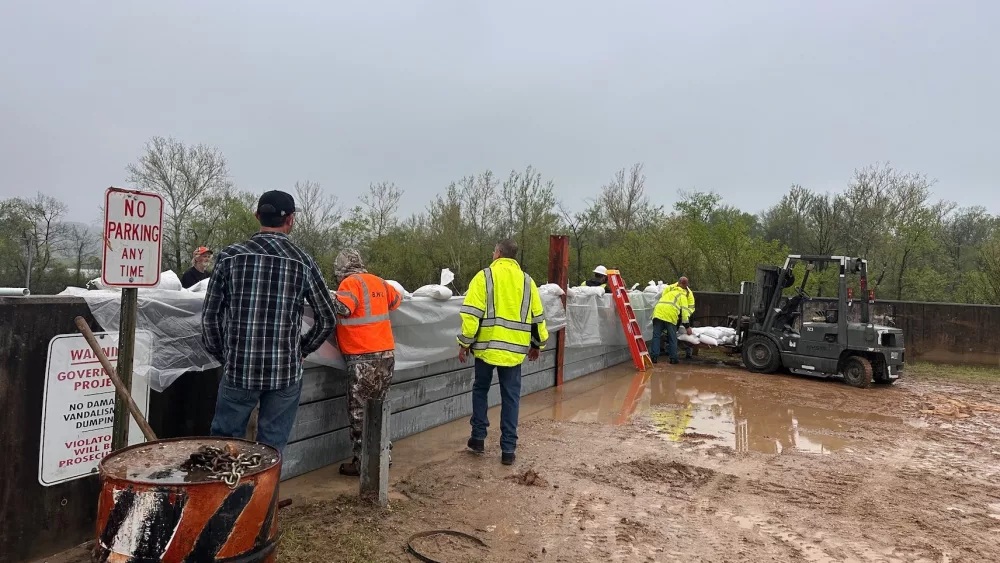
Chance Bradford, Mills High School student body president, speaks at a press conference inside the Arkansas Capitol’s Old Supreme Court room on Feb. 17, 2025. Participants spoke against proposed legislation that would alter the state’s ballot initiative process. (Sonny Albarado/Arkansas Advocate)
By Antoinette Grajeda, Arkansas Advocate
A divided House committee on Monday advanced two bills to regulate how signatures are gathered in Arkansas for citizen-led ballot initiatives after nearly six hours of debate that included at-times passionate testimony and bipartisan opposition.
Republican Sen. Kim Hammer of Benton is the lead sponsor of the legislation, which co-sponsor Rep. Kendon Underwood, R-Cave Springs, presented to the House Committee on State Agencies and Governmental Affairs on Monday.
If approved by the Legislature, Senate Bill 208 would require canvassers to request a photo ID from potential signers. Senate Bill 211 would require canvassers to file a “true affidavit.”
Sparked by concerns over the integrity of the ballot initiative process, Underwood said the legislation he sponsored aims to deter fraudulent activity, increase transparency and protect the democratic process by providing voter confidence in the system.
Opponents of the bills argued they would prevent Arkansans’ voices from being heard because these new regulations would make it more difficult to qualify for the ballot, a feat that few initiatives accomplish under current laws.
“Y’all are supposed to work for us, yet y’all make sure that we never have a voice to be heard. You have no idea how hard that is. I have fought for 14 years, 14 years. I’m a 70-year-old grandmother that’s tired of fighting. At every single session I have to come up here to fight for my right to have a voice and you completely ignore it.” — Melissa Fults, opponent of the bills.
The rules lawmakers have passed “do nothing to fix the problem,” Melissa Fults said. As someone who’s worked on ballot initiatives for a long time, Fults said she has for years begged lawmakers to work with people leading these efforts if they really want to address issues with the process.
“Y’all are supposed to work for us, yet y’all make sure that we never have a voice to be heard. You have no idea how hard that is,” she said. “I have fought for 14 years, 14 years. I’m a 70-year-old grandmother that’s tired of fighting. At every single session I have to come up here to fight for my right to have a voice and you completely ignore it.”
If approved by the Legislature, Senate Bill 208 would require canvassers to request a photo ID from potential signers. Senate Bill 211 would require canvassers to file a “true affidavit” with the secretary of state certifying they complied with the Arkansas Constitution and state laws related to canvassing, perjury, forgery and fraudulent practices in the procurement of petition signatures. Signatures submitted without the affidavit would not be counted.
Opponents of SB 211 said they were concerned the bill doesn’t provide a remedy for citizens whose signatures are disqualified because of a canvasser’s actions. They also expressed concern about the ability of a measure’s opponents to falsely accuse a canvasser of not following procedures in the proposed laws.
Sponsors of the bill have cited duplicated signatures as a threat to the integrity of the ballot initiative process. Rep. Andrew Collins, D-Little Rock, said SB 211 wouldn’t address that issue. Signing more than once is already against the law, and the secretary of state’s office currently culls duplicated signatures, he said.
Leslie Bellamy, director of elections for the Arkansas Secretary of State, said the intent of the bill is to deter bad actors. The concern, Bellamy said, is there’s incentive for people to submit invalid signatures in order to meet an initial threshold to qualify for a “cure period” that provides sponsors with an additional 30 days to gather more valid signatures in order to qualify for the ballot.
Rep. David Ray, a Maumelle Republican who’s running his own bills to amend the ballot initiative process, asked how many submitted signatures are typically deemed invalid. Bellamy estimated that most ballot measures have roughly 30% of signatures deemed invalid.
“In what other area of American life would we find a failure rate of 20% to 40% to be acceptable,” Ray said. “Would it be acceptable, for example, if a doctor lost 20% to 40% of their patients?”
Collins said having this data means the system is working because invalid signatures are being caught. State officials said this is what they’re catching, but there could be more.
At a midday press conference hosted by a coalition of advocacy groups, speakers called on Hammer to pull his bills because they would make it more difficult for grassroots organizations like theirs to make citizens’ voices heard through the ballot initiative process.
If passed, speakers argued the bills would slow the process and intimidate Arkansans from participating because making “an honest mistake” could result in criminal prosecution.
 April Reisma, Arkansas Education Association president, speaks against bills to alter the petition-gathering process for ballot initiatives during a press conference at the Capitol on Feb. 17, 2025. (Sonny Albarado/Arkansas Advocate)
April Reisma, Arkansas Education Association president, speaks against bills to alter the petition-gathering process for ballot initiatives during a press conference at the Capitol on Feb. 17, 2025. (Sonny Albarado/Arkansas Advocate)
Arkansas Education Association President April Reisma noted at the press conference that Monday was a state holiday for Daisy Gatson Bates, a civil rights leader who helped the Little Rock Nine integrate Little Rock’s Central High School in 1957.
Reisma, who also chairs a ballot question committee working on a proposed constitutional amendment on education, argued that the Legislature is “stripping away” citizens’ rights, “the very rights that Ms. Bates fought so valiantly for.”
“Petitioning allows voters to have a right to have shared power with lawmakers,” Reisma said. “These bills represent a power grab by politicians that threaten to strip that right from their constituents’ hands. Arkansas already has one of the most secure petitioning processes in the country.”
Arkansas is one of 24 states that allows for citizen-led initiatives, according to the National Conference of State Legislatures.
Under Article 5 Section 1 of the state Constitution, Arkansans can propose laws and constitutional amendments or repeal state laws through the initiative and referendum process, which requires citizens to collect a certain number of signatures that must be certified by state officials before being placed on the ballot for a vote.
Because many people showed up to testify on the bills, Committee Chair Jimmy Gazaway, R-Paragould, permitted them to speak and did not limit their time. Members of the public, nearly all of whom spoke against the bills, thanked Gazaway for letting their voice be heard.
As one of his constituents, Reisma called on Hammer to pull his bills.
“I see you want to run for secretary of state, and I see you setting yourself up for this,” she said. “Let the people continue to have a voice. Let this be 2025, not 1957.”
Hammer announced his bid for secretary of state in January.
The House committee on Monday night did pull Senate Bill 207, which would require canvassers to disclose to potential signers that petition fraud is a Class A misdemeanor. Collins pointed out, and chairman Rep. Jimmy Gazaway, R-Paragould, agreed that there is a section of Arkansas code that classifies petition fraud as a Class D felony. Collins and Gazaway are both attorneys.
Underwood agreed to pull the bill to investigate the potential conflict in statute. Gazaway said the committee could consider the bill on Wednesday.
Because many people showed up to testify on the bills, Gazaway permitted them to speak and did not limit their time. Members of the public, nearly all of whom spoke against the bills, thanked Gazaway for letting their voice be heard.
Fayetteville Democrat Rep. Nicole Clowney also shared her gratitude for the public’s participation.
“I just want everybody who showed up and stuck around this whole time to know that your voice mattered and we are grateful to have heard from you,” Clowney said.
The Arkansas Advocate is a nonprofit, nonpartisan news organization dedicated to tough, fair daily reporting and investigative journalism that holds public officials accountable and focuses on the relationship between the lives of Arkansans and public policy.
Have a news tip or event to promote? Email White River Now at news@whiterivernow.com. Be sure to like and follow us on Facebook and Twitter. And don’t forget to download the White River Now mobile app from the Google Play Store or the Apple App Store.
Get up-to-date local and regional news/weather every weekday morning and afternoon from the First Community Bank Newsroom on Arkansas 103.3 KWOZ. White River Now updates are also aired on weekday mornings on 93 KZLE, Outlaw 106.5, and Your FM 99.5. Catch CBS News around the top of every hour on 1340 KBTA.












